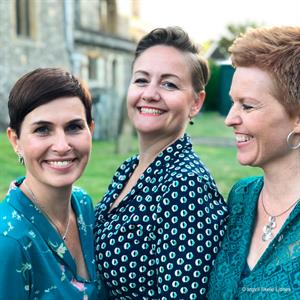Trio Mediaeval, composed of three brilliant singers from Norway, quickly made a name for itself in the world of vocal music after its establishment. It is going to present us two concerts at this year’s Music Festival. In Folk Songs, the Trio will perform a selection of Norwegian and Swedish love songs, wedding tunes, lullabies, sun-prayers, ballads, religious hymns and instrumental tunes, with its extraordinary vocal expertise.
Norwegian and Swedish vocal folk music is distinctive with its tradition of singing without words, a style known as tulling, sulling or tralling in which a sequence of consonants is invented or improvised by the singer. In dance music, which is characterised by rhythmic, often rapid instrumental-sounding passages and uneven beats, singers create their own sounds using plosives and nasal consonants with relatively light vowels. Trio Mediaeval will rearrange the old songs and ballads from its homeland and investigate its Scandinavian roots with a powerful and compelling account of Norwegian folk songs.
Duration: Approximately 1 hour and 30 minutes, including one interval
Programme Highlights
Traditional folk song (Norway) / Arr. L. A. Fuglseth: Lova Line
Traditional medieval ballad (Sweden) / Arr. A. M. Friman: St. Örjan och draken
Traditional wedding tune (Norway) / Arr. T. Krohn: Bruremarsj fra Gudbrandsdalen
Traditional hymn (Norway) / Arr. L. A. Fuglseth: Fryd dig, du Kristi brud
Traditional chanty (Sweden) / Arr. A. M. Friman: Du är den första
Anna Maria Friman, Vocal, Hardanger Fiddle and Melody Chimes
Linn Andrea Fuglseth, Vocal, Shruti Box and Melody Chimes
Jorunn Lovise Husan, Vocal and Melody Chimes

Folk Songs
Is there anything wrong with this page?

